综合英语第3册第一单元知识点Keys--unit1-2-1
- 格式:doc
- 大小:42.50 KB
- 文档页数:3
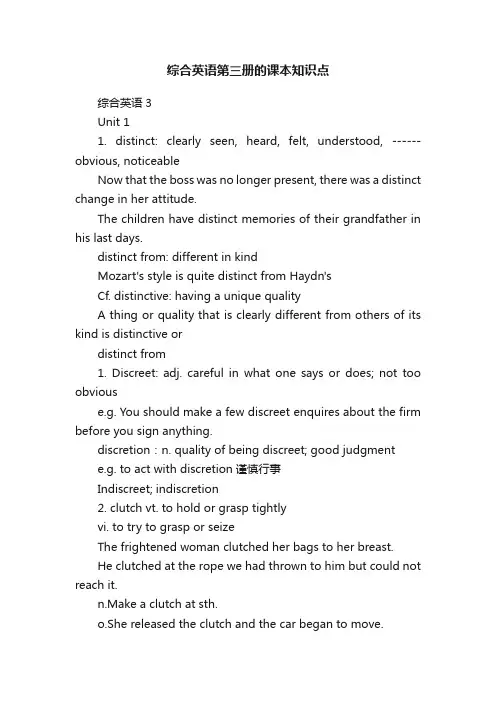
综合英语第三册的课本知识点综合英语3Unit 11. distinct: clearly seen, heard, felt, understood, ------ obvious, noticeableNow that the boss was no longer present, there was a distinct change in her attitude.The children have distinct memories of their grandfather in his last days.distinct from: different in kindMozart's style is quite distinct from Haydn'sCf. distinctive: having a unique qualityA thing or quality that is clearly different from others of its kind is distinctive ordistinct from1. Discreet: adj. careful in what one says or does; not too obviouse.g. You should make a few discreet enquires about the firm before you sign anything.discretion:n. quality of being discreet; good judgmente.g. to act with discretion谨慎行事Indiscreet; indiscretion2. clutch vt. to hold or grasp tightlyvi. to try to grasp or seizeThe frightened woman clutched her bags to her breast.He clutched at the rope we had thrown to him but could not reach it.n.Make a clutch at sth.o.She released the clutch and the car began to move.3. Reserve: n. self-restraint in expressionBeing a man of reserve, Mr. York was never popular with his colleagues.A few drinks broke through his reserve.Practice: 她一反平素的沉默寡言,表现得很活跃。
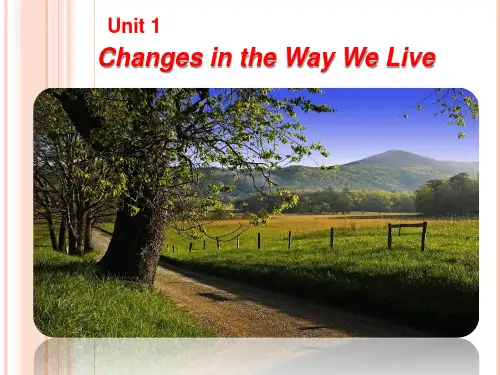
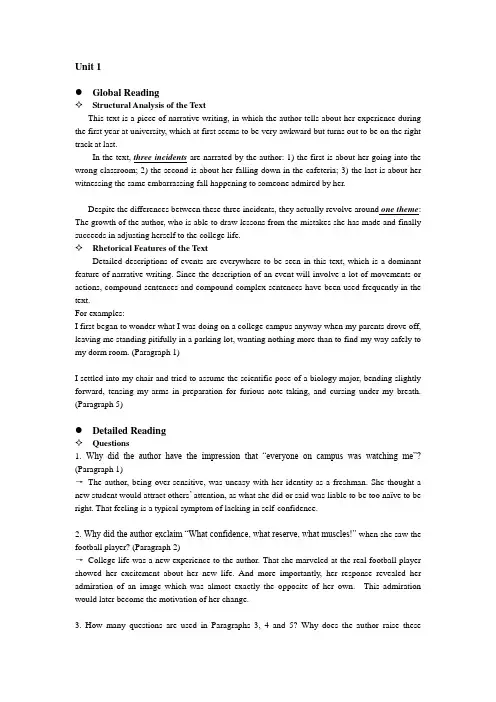
●Global Reading✧Structural Analysis of the TextThis text is a piece of narrative writing, in which the author tells about her experience during the first year at university, which at first seems to be very awkward but turns out to be on the right track at last.In the text, three incidents are narrated by the author: 1) the first is about her going into the wrong classroom; 2) the second is about her falling down in the cafeteria; 3) the last is about her witnessing the same embarrassing fall happening to someone admired by her.Despite the differences between these three incidents, they actually revolve around one theme: The growth of the author, who is able to draw lessons from the mistakes she has made and finally succeeds in adjusting herself to the college life.✧Rhetorical Features of the TextDetailed descriptions of events are everywhere to be seen in this text, which is a dominant feature of narrative writing. Since the description of an event will involve a lot of movements or actions, compound sentences and compound-complex sentences have been used frequently in the text.For examples:I first began to wonder what I was doing on a college campus anyway when my parents drove off, leaving me standing pitifully in a parking lot, wanting nothing more than to find my way safely to my dorm room. (Paragraph 1)I settled into my chair and tried to assume the scientific pose of a biology major, bending slightly forward, tensing my arms in preparation for furious note-taking, and cursing under my breath. (Paragraph 5)●Detailed Reading✧Questions1. Why did the author have the impression that “everyone on campus was watching me”? (Paragraph 1)→The author, being over-sensitive, was uneasy with her identity as a freshman. She thought a new student would attract others’ attention, as what she did or said was liable to be too naïve to be right. That feeling is a typical symptom of lacking in self-confidence.2. Why did the author exclaim “What confidence, what reserve, what muscles!” when she saw the football player? (Paragraph 2)→College life was a new experience to the author. That she marveled at the real football player showed her excitement about her new life. And more importantly, her response revealed her admiration of an image which was almost exactly the opposite of her own. This admiration would later become the motivation of her change.3. How many questions are used in Paragraphs 3, 4 and 5? Why does the author raise these→Four elliptical questions are used in these paragraphs. Being a freshman, the author was not well acquainted with campus life. She was at a loss as to what to do when something unexpected happened. These questions are used to show her bewilderment.4. Why did she dine on junk food for the next three days? (Paragraphs 6-8)→Because she thought she had become the laughing-stock on campus. She couldn’t stand being laughed at by all the students when she turned up in the cafeteria.5. What was the key lesson Evelyn Herald learned during her first few weeks in college? (Paragraphs 10-14)→The key lesson she learned during her first few weeks in college was that she realized she didn’t have to pay too much attention to what other people were thinking about her. The fresh campus life was her big chance to do her own things and be her own person. She might well relax herself and stop worrying about making mistakes because people all grow by trial and error.✧Group discussion: What lessons have you learned from Evelyn’s experiences after readingthe article “Fresh Start”? Share the experiences when you first came to college.✧Words and ExpressionsParagraph 1distinct a.clearly seen, heard, felt, understood, etc.; noticeablee.g. Now that the boss was no longer present, there was a distinct change in her attitude.The children have distinct memories of their grandfather in his last days.Comparison: distinct & distinctivedistinct: Something that is distinct can clearly be seen, heard, smelled, etc.e.g. There is a distinct smell of beer in this room.distinctive: It means having a special quality, character, or appearance that is different and easy to recognize.e.g. Beer has a very distinctive smell; it’s quite distinct from the smell of wine.Practice:One of the _________ features of this book is its __________ illustrations.本书特点之一就是具有清楚明了的图解。
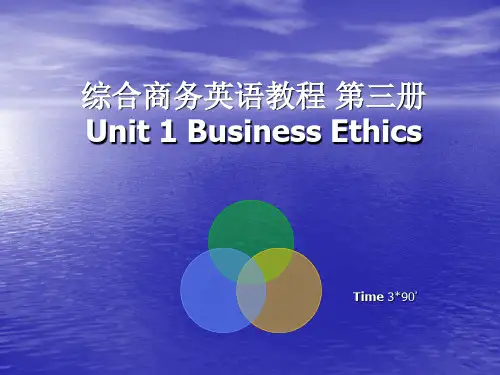
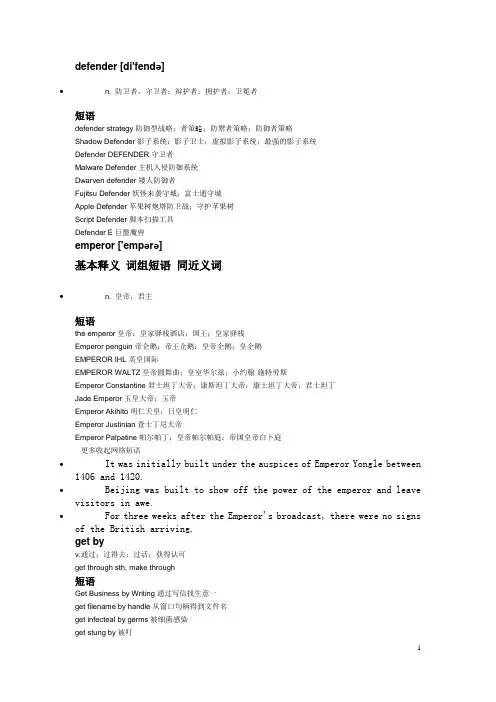
defender [di'fendə]∙n. 防卫者,守卫者;辩护者;拥护者;卫冕者短语defender strategy防御型战略;者策略;防禦者策略;防御者策略Shadow Defender影子系统;影子卫士;虚拟影子系统;最强的影子系统Defender DEFENDER守卫者Malware Defender主机入侵防御系统Dwarven defender矮人防御者Fujitsu Defender妖怪来袭守城;富士通守城Apple Defender苹果树炮塔防卫战;守护苹果树Script Defender脚本扫描工具Defender E巨螫魔兽emperor ['empərə]基本释义词组短语同近义词∙n. 皇帝,君主短语the emperor皇帝;皇家驿栈酒店;国王;皇家驿栈Emperor penguin帝企鹅;帝王企鹅;皇帝企鹅;皇企鹅EMPEROR IHL英皇国际EMPEROR WALTZ皇帝圆舞曲;皇室华尔兹;小约翰·施特劳斯Emperor Constantine君士坦丁大帝;康斯坦丁大帝;康士坦丁大帝;君士坦丁Jade Emperor玉皇大帝;玉帝Emperor Akihito明仁天皇;日皇明仁Emperor Justinian查士丁尼大帝Emperor Palpatine帕尔帕丁;皇帝帕尔帕庭;帝国皇帝白卜庭更多收起网络短语∙It was initially built under the auspices of Emperor Yongle between 1406 and 1420.∙Beijing was built to show off the power of the emperor and leave visitors in awe.∙For three weeks after the Emperor's broadcast, there were no signs of the British arriving.get byv.通过;过得去;过活;获得认可get through sth, make through短语Get Business by Writing通过写信找生意一get filename by handle从窗口句柄得到文件名get infecteal by germs被细菌感染get stung by被叮And get blessed by并获得赐福get elected by bribery贿选get money by fraud骗钱get juice by pounding捣取汁get excited by因更多收起网络短语以上来源于: WordNet 双语例句原声例句权威例句∙The average wage is about 400 dollars a month-- just enough to get by.∙That's too bad for Deeds, because he knows what it's like to struggle to get by. ∙"Everyone is trying to get by with less, " said Frank Mylar, an attorney for the county.frustration [frʌs'treiʃən]n.[心理]挫折setback, clawback短语frustration tolerance挫折耐力;挫折容忍力frustration function[力] 窘组函数act frustration行动挫折Frustration Aggression挫折攻击;攻击Frustration Man出气筒Barrier Frustration训犬中的阻绝挫折感commercial frustration商业落空geometrical frustration几何阻挫Nesting frustration筑巢失败更多收起网络短语以上来源于: WordNet 双语例句原声例句权威例句∙Ms James also spoke of her frustration at being labelled a Lesbian Conservative by the media. ∙Jane calmly listened to all his complaints and acknowledged the frustration he was feeling.∙The thought of having to return some of his federal aid only compounds his frustration.suburban [sə'bə:bən]suburban district 郊区suburban area 近郊区域;附廓区suburban railway 市郊铁路;郊外铁路suburban [sə'bə:bən]adj.1. 郊区的,市郊的,近郊的2. 是郊区特性的,有郊区人特点的3. [贬义]土气的;褊狭的;乏味的;古板的n.1. 郊区居民2. = station wagon以上来源于: WordNet 双语例句原声例句权威例句∙We live on a quiet suburban cul-de-sac, which we value as a safe place to raise our family.我们住在一个安静的郊区死胡同,那个地方我们认为非常的安全,足够保护我们一家。



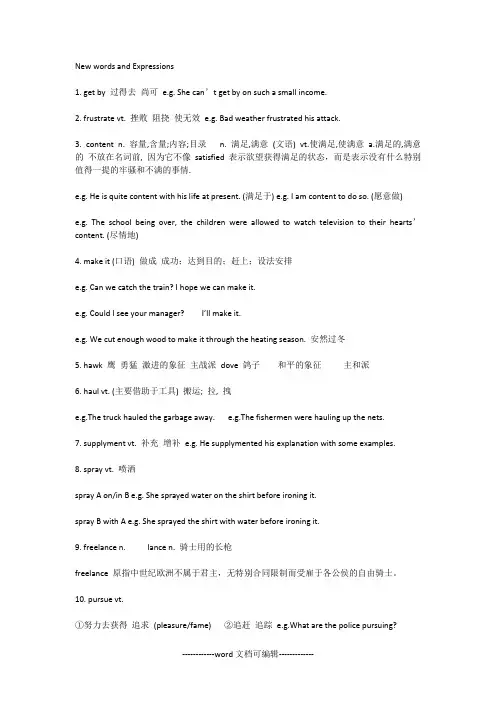
New words and Expressions1. get by 过得去尚可e.g. She can’t get by on such a small income.2. frustrate vt. 挫败阻挠使无效e.g. Bad weather frustrated his attack.3. content n. 容量,含量;内容;目录n. 满足,满意(文语) vt.使满足,使满意a.满足的,满意的不放在名词前, 因为它不像satisfied表示欲望获得满足的状态,而是表示没有什么特别值得一提的牢骚和不满的事情.e.g. He is quite content with his life at present. (满足于) e.g. I am content to do so. (愿意做)e.g. The school being over, the children were allowed to watch television to their hearts’content. (尽情地)4. make it (口语) 做成成功;达到目的;赶上;设法安排e.g. Can we catch the train? I hope we can make it.e.g. Could I see your manager? I’ll make it.e.g. We cut enough wood to make it through the heating season. 安然过冬5. hawk 鹰勇猛激进的象征主战派dove 鸽子和平的象征主和派6. haul vt. (主要借助于工具) 搬运; 拉, 拽e.g.The truck hauled the garbage away. e.g.The fishermen were hauling up the nets.7. supplyment vt. 补充增补e.g. He supplymented his explanation with some examples.8. spray vt. 喷洒spray A on/in B e.g. She sprayed water on the shirt before ironing it.spray B with A e.g. She sprayed the shirt with water before ironing it.9. freelance n. lance n. 骑士用的长枪freelance 原指中世纪欧洲不属于君主,无特别合同限制而受雇于各公侯的自由骑士。
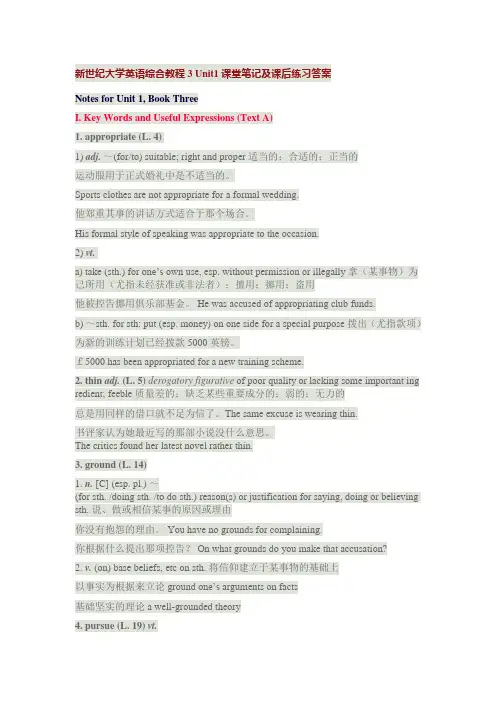
新世纪大学英语综合教程3 Unit1 课堂笔记及课后练习答案Notes for Unit 1, Book ThreeI. Key Words and Useful Expressions (Text A)1. appropriate (L. 4)1) adj.~(for/to) suitable; right and proper 适当的;合适的;正当的运动服用于正式婚礼中是不适当的。
Sports clothes are not appropriate for a formal wedding.他郑重其事的讲话方式适合于那个场合。
His formal style of speaking was appropriate to the occasion.2) vt.a) take (sth.) for one’s own use, esp. without permission or illegally 拿(某事物)为己所用(尤指未经获准或非法者);擅用;挪用;盗用他被控告挪用俱乐部基金。
He was accused of appropriating club funds.b) ~sth. for sth: put (esp. money) on one side for a special purpose 拨出(尤指款项)为新的训练计划已经拨款5000英镑。
£5000 has been appropriated for a new training scheme.2. thin adj. (L. 5) derogatory figurative of poor quality or lacking some important ing redient; feeble 质量差的;缺乏某些重要成分的;弱的;无力的总是用同样的借口就不足为信了。
The same excuse is wearing thin.书评家认为她最近写的那部小说没什么意思。
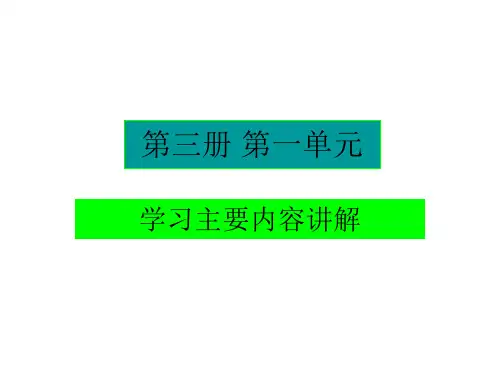
Unit11.squareV.①set straight or at approximate right angles e.g. ~ shoulders② ~ with=agree with2.discreet= cautious/prudent/carefulE.g. It is not ~ of u to say that.Be more ~, or you'll get urself talked about.(成为人们的话柄) 3.ReserveN.含蓄,矜持E.g. She spoke with ~.V.保留,预留(为以后用)I ~ monday for answer' letter.The seats were ~ed for the elderly.→a. ~d.缄默的.E.g. The English have a reputation of being ~ed.4.i'm at loss respecting his whereabouts.At loss=confused; respecting=关于;whereabouts(n.下落)5.grope(摸索)v.t./vi+ prep:for/afterE.g. They're ~ing after the truth.She blew out a candle ,and ~d her way into bed.6.Tip off →vTip-off →nE.g. The criminal was ~ped off to flee in time.N. ①.the tip of iceberg冰山一角②.小费→v.给小费~ sb e.g.tio the waitress /waiter③ a tip on/for sth 窍门 e.g. I gave her a tip on how to make the soup.7.Goody.n.n. 糖果;身份低微之老妇;吸引人的东西;伪君子adj. 感伤的;伪善的;假正经的int. [儿语]太好啦8.Flail v. 挥动乱晃The dying lamb fell, its legs ~ing about helplesslyvt. 打;用连枷打vi. 打;用连枷打n. 连枷(打谷物用的工具)9.maneuver n.N. ①<军事> military drill 军事演习To perform ~s进行军事演习<军事>tactic策略,谋略The prime minister thwarted (挫败、反对) the opposition's ~ to take power.V ①VI.+ for (≈plan)谋取、谋划E.g. ~ for a position of power② VT 调动skillfully move,巧妙处理E.g. He maneuvered his car into garage.10.brigade①a rescue brigade救援队②旅(军)command a brigade指挥一个队如:division师Regiment团Company 连Ba'ttalion营11.sneakV. I didn't notice Tom ~ing up on me.鬼鬼祟祟地走了上来12. Sb's heart goes out to sb.为……同情(中性)13.clasp v. 紧握于手中E.g. He was ~ing the vase tightly,terrified of dropping it.14.slink ≈sneak (slink-slunk-slunk)e.g.The defeated army slunk back to its stronghold(据点) in the mountains.15. The malicious neighbour tends to spread the gossip.16. To break the shackles(镣铐) of convention打破传统的束缚几个区别:17.distinct&distinctiveDistinct:clearly noticed,明显的Distinctive: different with others in the same kindE.g. The beer has a distinctive smell, compared with other beverages.18.glance与glimpseGlance = quick look 有意识地瞥见(强动作)Glimpse = short look 1。
Book 3--Unit 1Text comprehension(Pp. 6-7)I. CII. 1.F 2.T 3.F 4.T 5.FIII. 1. Refer to para. 1 and 2. She felt “first-gradish” on her arriv al at the campus. The “first-gradish” feeling refers basically to naivety and anxiety, so she attempted to behave in a perfect way with the hope that no one would notice she was a freshman.2. Refer to para.3. She chose to sit in the front row and to the side. This was because the freshman manual suggested sitting near the front to show that one is an intelligent and enthusiastic student, but as she was not confident enough to sit in the professor’s direct line of vision, she chose a side seat in the front row.3. Refer to para.6. she felt as is her life had plunged into total failure and the doom of life had come.4. Refer to para.9. The football player got up, hands held high above his head in a victory clap, which is an expression of fun. At this moment, Evelyn realized that she had been too serious and on the contrary her slip could be a moment of fun for other people and herself alike. Everyone may have done something dumb, but they have all survived after all.5. Refer to para.13 and 14. She understood that one could live his college life as an experiment. She should not be afraid of making mistakes because it is only through trial and error that one can find his real self and finding his real self is ultimate purpose of a college education. The college allows one to make massive mistakes. And even after graduation, she was still making mistakes of which she was no longer afraid.IV. 1. I planned to keep silent and act in such a way that nobody would notice that I was only a newcomer in college.2. For three days, I had not been to the cafeteria due to my feeling of humiliation and shame. Instead, I stayed alone in my room and ate junk food of various kinds from a vending machine which was I just the right place to aid me in avoiding others.3. It didn’t matter whether or not you were widely accepted or admired; you did not have to behave to the liking of everybody else.Vocabulary (Pp. 8-9)I. 1. I was feeling just a bit first-gradish. →I had just the feeling of a newcomer a college without the strength a mature student might possess. / I thought I had the qualities and characteristics of a first-grade student.2. my airs of assurance →my apparent confidence3. a little nourishment →some food to appease my hunger (as well as my anxiety)4. running with the crowd was no longer a law of survival. →going with the tide was no longer crucial to one’s success. / you did not have to behave to the liking of everybody else.5. massive mistakes →foolish and glaring mistakesII. (注意事态和数!!)1.distress 2. clutched 3.pose 4.sneaked5. preoccupation6.shackles7.curse8.deliberationIII. (Word Derivation)1.assure说明:assurance n.→ assure v.→ assuring a.①她向我们保证一切都会好起来的。
一Assurance n.保证Despite repeated …s that the product is safe,many people have stopped buying it. Anthology/æn´θɔlədʒi/选集Ago自尊心brigade/bri´geid/n.队,派,帮barefoot/`beəfut/a.赤脚的We took off our shoes and socks and walked … along the beach.clasp/kla: sp/n.紧握,紧抓She held the child’s hand in a firm clasp as they crossed the road clutch v.紧握Silent and pale,she …ed her mother’s hand.crack v.打开cleanupconscience/`kɔntʃənts/n.良心composed adj.沉着的She looked remarkable … throughout the funeral.discreetly ad.谨慎的The family made enquiries zbout his background …dumb/dʌm/a,愚蠢的demeanor/di’mi: nər/n.外表deliberation/di´libə´rei ʃən/n.考虑flail/fleil/v.用力挥动或摆动foreground 前排furious/’fjuəriəs/a.强烈的,激烈的fate命运glimpsegrope/´grəup/v.摸寻grin from ear to ear 笑得合不拢嘴humiliation丢脸interpret?ketchup n.番茄酱malicious/mə’ liʃəs/a.意在伤人的,恶意的maneuver/mə’nu: və/n.技术动作mature/mə’ tjuər/a.慎重的,成熟的manual/mænjuəl/n,指南massive a.大量的nourishment/´nʌriʃmənt/n.营养puddle/’pʌdl/n.一小池液体pitifully ad.可怜地preoccupation/pri:¸ɔkju`peiʃən/n.想法reserve/ri’ zʒ: v/n.拘谨rear n.后背sandal/sændəl/n.凉鞋shackle/’ ʃækl/n.阻挠,束缚slink/sliŋk/v.sneak/sni: k/v.偷偷地走square/skweə/v.挺直身子scribble/´skribl/v.匆匆地写?Self-consciousness n.不自在,局促不安Strategically adv.战略性地tray/tʒei/n.盘子tiptoppletiptoe踮着脚走upright a.直立的vague/veig/a.模糊的whereabouts n.去向,下落tip off:give an advance warning or hint(暗示) itgo out to sb.同情某人kick off踢开三anew/ə`nju:/ad.重新,再agreeable a.惬意的acquaintance n.熟人,泛泛之交afterward以后I vote we go to the cinema first and eat…abandon v. 抛弃,放弃As a baby he’d been …ed by his mother.caloriecontortion/kən`tɔ: ʃən/n.扭曲,变形compact a.小巧的,紧凑的confess/k ə n’ f e s/v.坦白comprehensive/ ¸k ɔmpri’hentiv/a.全面的We offer you a … training in all aspects of the business.Charlottesville 夏洛次威尔debonair/¸debə’neə/a.轻松的,高兴的dodge/dɔdʒ/v.闪,躲闪decline v. 谢绝dash v.疾奔decorative/’dekərətiv/a.装饰性的He gave the picture a …border,which changed the look of the page. Dartmouth 达特蒙斯eccentric/ik’sentrik/a.异乎寻常的esthetically/es’θetikəli/ad.审美地,美学地exasperatating/ig’zæspəreitiŋ/a.使人恼怒的,激怒的extravagant a.过度的earth=shattering 极其重大的The lies were most often not what most of us would call …faintly adv。
Embarrassment n. 害羞;窘迫;愧疚;难堪E.g. Much to her embarrassment she realized that everybody had listening to her singing . Embarrassment (to/for sb.) 使人为难的处境;困境e.g. Her resignation will be a severe embarrassment to the party . 她的辞职即将使党处于极度的困境。
Embarrass v. (尤指在社交场合)使窘迫,使尴尬,使困惑;使为难;使陷入困境Embarrassed adj.--------embarrassedly adv.Be embarrassed about/at sth. E.g. She is embarrassed about her height.Be embarrassed to do sth.Embarrassing adj. 使人难堪的e.g. It was embarrassing having to sing in public.On campus在校内Off campus 校外Distinct adj. easily or clearly heard, seen , felt , etc. 清楚的,明白的,确实的e.g. There was a distinct smell gas .Distinct from sth. Clearly different or of a different kind e.g. rural areas, as distinct from major cities 完全不同于大城市的农村地区Distinctly adv. Distinctness n.Distinction n. 1)差别,区别,对比distinction between A and B2)优秀,杰出,卓越e.g. She had the distinction of being the first woman to fly the Atlantic.3)区别,分清,辨别e.g. The new law makes no distinction between adults and children.4)(尤指给学生的)优等评分,荣誉,奖赏e.g. He graduated with distinction. 他以优异成绩毕业。
Book 3--Unit 1Text comprehension(Pp. 6-7)I. CII. 1.F 2.T 3.F 4.T 5.FIII. 1. Refer to para. 1 and 2. She felt “first-gradish” on her arriv al at the campus. The “first-gradish” feeling refers basically to naivety and anxiety, so she attempted to behave in a perfect way with the hope that no one would notice she was a freshman.2. Refer to para.3. She chose to sit in the front row and to the side. This was because the freshman manual suggested sitting near the front to show that one is an intelligent and enthusiastic student, but as she was not confident enough to sit in the professor’s direct line of vision, she chose a side seat in the front row.3. Refer to para.6. she felt as is her life had plunged into total failure and the doom of life had come.4. Refer to para.9. The football player got up, hands held high above his head in a victory clap, which is an expression of fun. At this moment, Evelyn realized that she had been too serious and on the contrary her slip could be a moment of fun for other people and herself alike. Everyone may have done something dumb, but they have all survived after all.5. Refer to para.13 and 14. She understood that one could live his college life as an experiment. She should not be afraid of making mistakes because it is only through trial and error that one can find his real self and finding his real self is ultimate purpose of a college education. The college allows one to make massive mistakes. And even after graduation, she was still making mistakes of which she was no longer afraid.IV. 1. I planned to keep silent and act in such a way that nobody would notice that I was only a newcomer in college.2. For three days, I had not been to the cafeteria due to my feeling of humiliation and shame. Instead, I stayed alone in my room and ate junk food of various kinds from a vending machine which was I just the right place to aid me in avoiding others.3. It didn’t matter whether or not you were widely accepted or admired; you did not have to behave to the liking of everybody else.Vocabulary (Pp. 8-9)I. 1. I was feeling just a bit first-gradish. →I had just the feeling of a newcomer a college without the strength a mature student might possess. / I thought I had the qualities and characteristics of a first-grade student.2. my airs of assurance →my apparent confidence3. a little nourishment →some food to appease my hunger (as well as my anxiety)4. running with the crowd was no longer a law of survival. →going with the tide was no longer crucial to one’s success. / you did not have to behave to the liking of everybody else.5. massive mistakes →foolish and glaring mistakesII. (注意事态和数!!)1.distress 2. clutched 3.pose 4.sneaked5. preoccupation6.shackles7.curse8.deliberationIII. (Word Derivation)1.assure说明:assurance n.→ assure v.→ assuring a.①她向我们保证一切都会好起来的。
She assured us that everything would turn out all right.or She gave us her assurance that everything would turn out all right.②他的安慰话帮我排除了恐惧。
His assuring words helped to banish my fear.注:assure和ensure后面都可以接that 从句,但assure + n.(人)+ that,而ensure + that2.discretion说明:discreet a.→ discreetly ad.→ discretion n.①提出忠告要谨慎,接受忠告要虚心。
You need to be discreet in giving advice, humble in accepting it.②那人小心翼翼地把名片放进上衣口袋。
The man discreetly slipped the card into his top pocket.③他以最谨慎的态度处理此事。
He handled the matter with his best discretion.注:discreet 与discrete 区别。
discreet 指(人、言行)谨慎的,深谋远虑的,慎重的;而discrete指个别的,分离的,不连续的, e.g. The organisms can be divided into discrete categories.3.relaxation说明:relax v.→relaxing a. → r elaxation n.①你可以通过按摩来放松肌肉。
You can relax your muscles by massage.②业余爱好应该是可以使人放松的。
Hobbies are supposed to be relaxing.③瑜伽是一种可以使身心放松的运动。
Yoga is an exercise that can provide mental and physical relaxation.4.humiliate说明:humiliation n.→ humiliate v.→ humiliating a.①士可杀不可辱。
A scholar prefers death to humiliation.②他在老板面前批评他的同事,因而让同事蒙羞。
He humiliated his colleague by criticising him in front of the boss.③历史上中国曾被迫签署了太多屈节辱国的条约。
In history, China has been forced to sign too many humiliating treaties.5.strategy说明:strategically ad.→ strategic a.→ strategy n.①在战略上,我们应该藐视一切敌人。
Strategically we should despise all our enemies.②西部大开发战略吸引了全世界的注意。
The large-scale development strategy for the western region drew worldwide attention.③一般而言,首先参战的那方具有战略优势。
Generally, the first to the field of battle has the strategic advantage.6.embarrassment说明:embarrass v.→ embarrassing a.→ embarrassment n.①他淘气地寻找机会让他姐姐难堪。